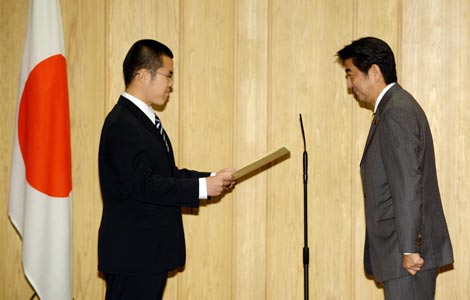Reform roadmap to announce detailed targets
Updated: 2013-11-15 17:10
(Xinhua)
|
||||||||
BEIJING - China has set 60 detailed targets in its soon-to-be-released reform roadmap to deepen overall reform, according to a senior economic official.
"'Reform' is the key word of the session's decision, with 60 detailed tasks covering 15 areas, each with far-reaching significance once implemented," said Yang Weimin, vice head of the Office of the Central Leading Group on Finance and Economic Affairs, a key economic policy-making institution.
The much-anticipated Third Plenary Session of the 18th Communist Party of China (CPC) Central Committee concluded on Tuesday with a communique giving clues about the reform agenda of the session's final decision statement, which is expected to be released soon.
The decision specified reform targets in the areas of economic, political, cultural, societal, ecological, and party progress to launch expansive and thorough reform, said Yang, who also took part in the draft of the decision.
Each area will have its own guiding principle to keep progress on track, Yang added.
Economic restructuring will lead the overall reform campaign, accounting for about half of the 15 major tasks, as the economy, after three decades of breakneck expansion, begins to slow down, burdened by industrial overcapacity, piles of debt and waning competitiveness.
The decision to allow the market to play a more "decisive" role in allocating resources is the top highlight of the agenda and the benchmark for reform assessment, as the core feature of the socialist market system, which was initiated in a landmark similar session 35 years ago, is to maximize resource use for better outcomes.
The country will try to better balance the role of the government and the market in economic development, according to the communique.
According to Yang, the government's power will be limited to macro-control, market monitoring, public service, environmental protection and social management, and more stakeholder are encouraged to enhance social management.
The decision proposes further defining the fiscal and tax mechanism to match and balance responsibilities of government agencies with their spending.
The current fiscal system was established in 1994 and delegates powers to local governments while reinforcing the central government's sway on the macroeconomy. The system has to be improved as many cash-strapped local governments now face debt problems.
State-owned enterprises and assets will experience further reforms as the decision sets new rules and targets to encourage private ownership to play an important role.
In addition, the session made the unprecedented decision to set up a monitoring system to promote ecological progress and to stem and punish environmental pollution and natural resources abuse, Yang said.
The new leadership set a timetable for concrete realization of the reform targets by the end of 2020 and will set up a top reform leadership group to push reform past the barriers of vested interests and avoid the country falling into the "middle-income trap."
"The determination to reform and the courage to break interest barriers is unprecedented," Yang said.

 US carrier starts Philippine storm relief
US carrier starts Philippine storm relief
 Treasures under the hammer
Treasures under the hammer
 'Reverse' vending machine sells idea of recycling
'Reverse' vending machine sells idea of recycling
 Heroic act helps thaw icy ties
Heroic act helps thaw icy ties
 Newtown families mark anniversary with a plea for parents to unite
Newtown families mark anniversary with a plea for parents to unite
 China's changing fashion since 1978
China's changing fashion since 1978
 Healthy baby born to brain-dead mom in Hungary
Healthy baby born to brain-dead mom in Hungary
 Top 10 romantic places to meet your Miss Right
Top 10 romantic places to meet your Miss Right
Most Viewed
Editor's Picks

|

|

|

|

|

|
Today's Top News
CCNY to occupy US's tallest building
US treasury chief makes 2nd trip to China
Nobel prize winner's connections with China
Canada should think globally: official
 CCA buys on Hudson riverfront
CCA buys on Hudson riverfront
US spying agencies out of control
Yancoal strides into the potash game
Green chance offered to investors
US Weekly

|

|






